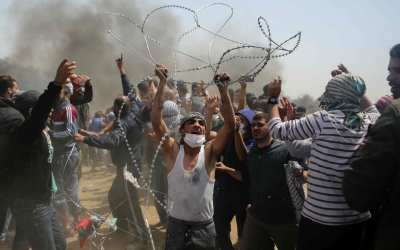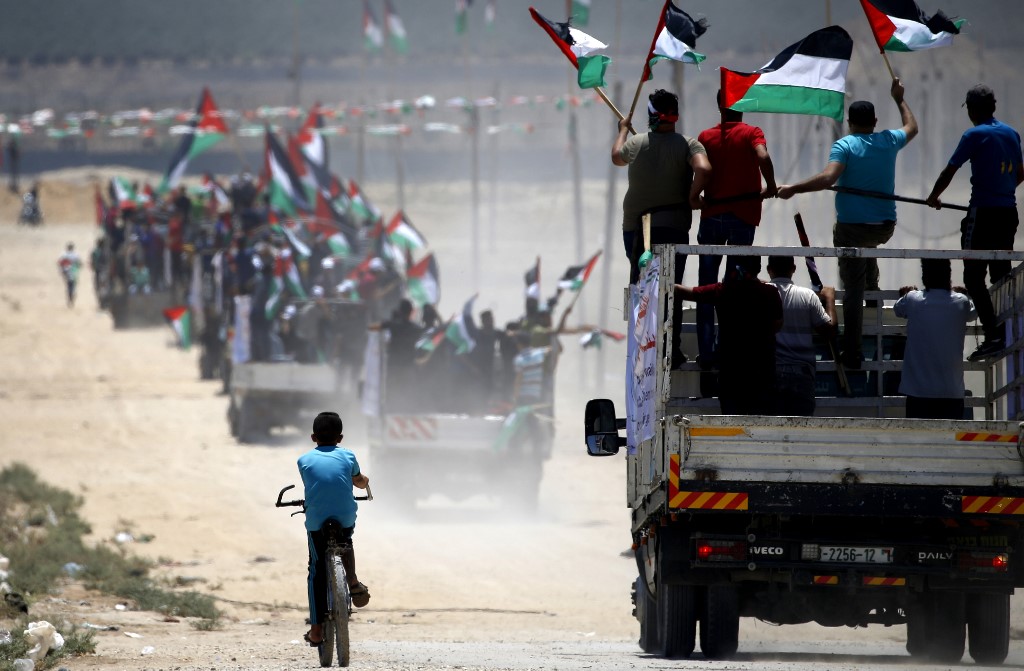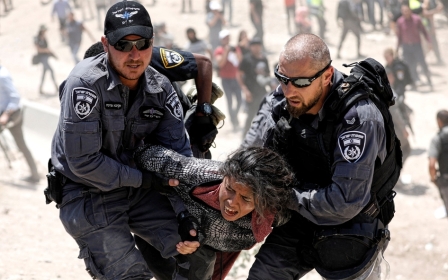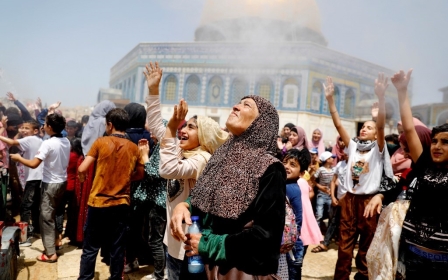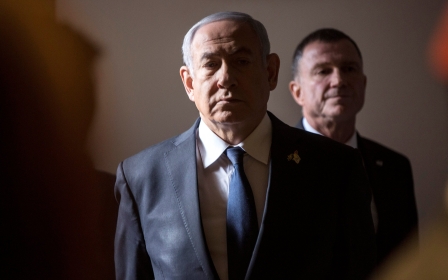Israeli protest crackdown defies notion of 'democracy'
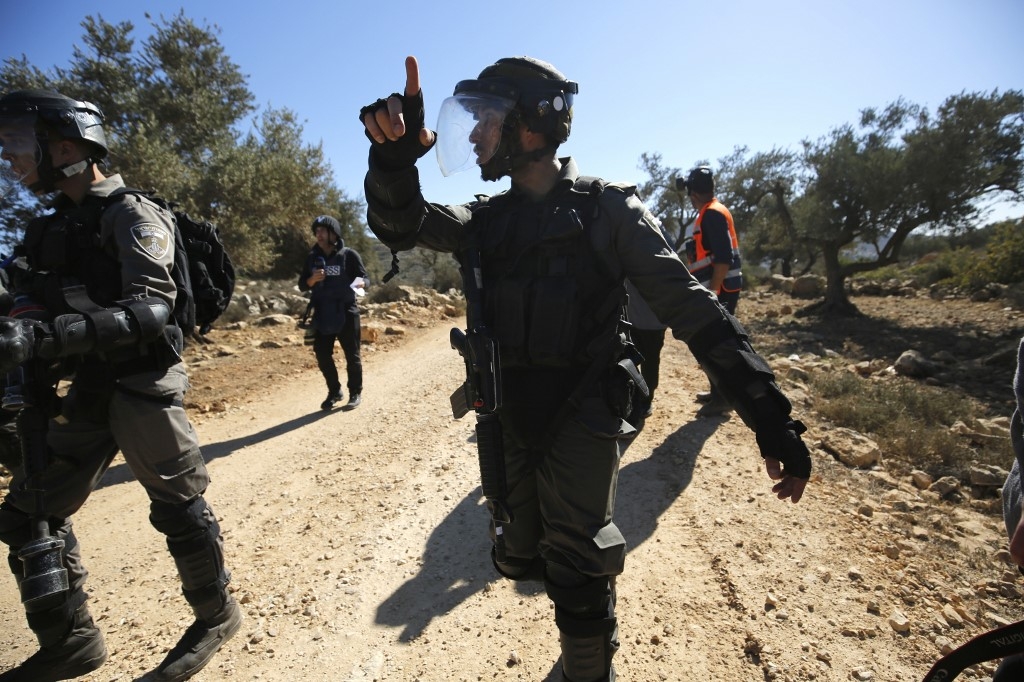
A Freedom of Information appeal by Israeli civil rights advocates has exposed that Israeli police secretly compiled a set of policies to clamp down on the rights of citizens to hold protests and assemblies, highlighting the fraudulent nature of Israel's "democracy".
Two years ago, Israel's High Court ruled that citizens could hold demonstrations without a permit, after police attempted to prevent weekly anti-corruption protests in Petah Tikva. The ruling was not a surprise, as the protesters were middle- and upper-class secular Israeli Jews who likely considered Israel a democracy and took their right to protest for granted.
The precedent created by the High Court, however, threatened to undermine Israel's long tradition of repressing protests by minority groups, including ultra-Orthodox Jews, black Jews, Mizrahim and, most commonly, Palestinian citizens of Israel.
Preemptive arrests
To circumvent the court's decision, newly revealed documents show, police focused on a peripheral part of the ruling that allows them to restrict assemblies in extreme cases, when there is a high probability of danger to public order.
New MEE newsletter: Jerusalem Dispatch
Sign up to get the latest insights and analysis on Israel-Palestine, alongside Turkey Unpacked and other MEE newsletters
Police invented a new legal term of a "protest event," when more than 50 people assemble to convey a message. When this happens, police may demand that organisers apply for a permit in advance.
In 2009, I was invited to give testimony to the UN Goldstone Commission on the 2008-09 Israeli invasion of Gaza. One of the topics I was asked to cover was the repression of protests within Israel. I only had a few days to prepare, and took a crash course with the help of Israeli free-speech organisations.
I told the commission that, during the invasion, I participated freely in demonstrations in Jerusalem and Tel Aviv by Jewish-Israeli activists, but that Palestinian citizens of the state did not enjoy the right to protest, with hundreds arrested on the bogus charge of "protesting without a permit". Citizens were also preemptively arrested to prevent them from holding protests.
In a colonial society, the role of the police is not to preserve law and order, but to preserve the hegemony of the ruling class.
From the very establishment of the state, Israeli police have repressed Palestinians and used violence to keep them from protesting against injustice and discrimination. Police violence against Palestinians reached a critical moment with the killing of six citizens on 30 March 1976, commemorated annually as Land Day.
Colonial repression
In an attempt to court Palestinian voters, former prime minister Ehud Barak, who now heads the Israel Democratic Party, recently apologised for the killing of 13 Palestinian citizens of Israel in October 2000 by Israeli police.
Shortly afterwards, however, he tweeted that "Petah Tikva is not Umm al-Hiran, people are allowed to demonstrate" - suggesting that Israeli Palestinian citizens in Umm al-Hiran do not have the right to protest, in his opinion.
The repression spreads beyond Palestinians. In the past, police used deadly force to repress the Mizrahi Black Panther movement, and last month Israeli streets were teeming with protesters after a black Jew was shot dead by police.
Ultra-Orthodox Jews protesting against forceful army recruitment policies have also learned to expect clubs, horses, stun grenades, water cannon and tear gas.
Over the past five years, Israeli police have fatally shot 14 Israeli citizens, without a single indictment against a police officer.
The right to hold demonstrations without applying for a permit is a basic collective and democratic right. This right is enshrined in Israeli law and was interpreted as a basic right by the High Court in 2017, but in a colonial state, laws only apply when authorities deem them convenient.
Israel's nation-state law, passed last year, clarified that collective rights only apply to Jewish citizens, thus disqualifying Israel from being considered a democracy.
Completing the circle
Indeed, last week, Israeli police charged into a demonstration in occupied East Jerusalem, attacking a member of the Israeli Knesset, Ofer Cassif, and his parliamentary assistant. Cassif is Jewish, but he was waving a Palestinian flag. Although waving the Palestinian flag is not illegal, police assaulted him, arrested his assistant and confiscated the flag.
The law, in a colonial state, is a tool used by authorities - but never used to restrict their authority
The law, in a colonial state, is a tool used by authorities - but never used to restrict their authority.
And so, the circle is now complete. Jewish-Israelis have been overwhelmingly silent on the denial of civil rights to minority groups, thinking that the courts would defend their own rights. But with Israeli police having found a way to ignore the court's decision, and to restrict the protest rights of even Israel's most privileged citizens, demands to uphold Israeli "democracy" ring hollow.
The views expressed in this article belong to the author and do not necessarily reflect the editorial policy of Middle East Eye.
Middle East Eye delivers independent and unrivalled coverage and analysis of the Middle East, North Africa and beyond. To learn more about republishing this content and the associated fees, please fill out this form. More about MEE can be found here.



